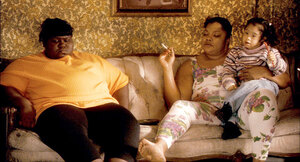Believe the hype: Sundance winner is a ‘Precious’ gem
When a small independent film achieves mainstream success through several festival wins and early critical praise, a tidal wave of backlash is almost inevitable.
Usually, the innocent underdog is tossed on a pedestal so fast that Oscar purists are quick to call sabotage before the hype can smother anybody else. Slap the names Oprah Winfrey and Tyler Perry into the marketing campaign, and the skepticism concerning the film’s “indie cred” continues to spike.

Oscar contender · After a strong showing at the Sundance and Toronto film festivals, Precious: Based on the Novel Push by Sapphire is becoming one of the leading, and most unlikely films of the 2009 Academy Awards race. - Photo courtesy of Lionsgate
But with its kitchen sink realism, Precious: Based on the Novel Push by Sapphire is the antithesis of everything you’ve ever known about award-winning films, which seem to adhere to a rather formulaic set of conventions: biopic, political drama and period piece.
Yes, Precious is the only film in history to have won both the prestigious Grand Jury Prize at Sundance and the People’s Choice Award at the Toronto International Film Festival. But if you asked Precious herself what she thinks about these superfluous awards, she’d probably repeat the first words we hear her say out loud in the film: “Shut the fuck up.”
Precious tells the story of a 16-year-old overweight African-American girl living in Harlem in the late 1980s. Adding to her hardship is her pregnancy with her second child — the result of an abusive father — and the fact that she is stuck in a crowded public high school where she is either ignored or tormented.
Her home life is even worse: Her mother, Mary, lives off fried pig’s feet, cigarettes, Jeopardy reruns and stolen welfare checks.
Precious’ only saving grace comes in the form of an alternative school called Each One Teach One, where she learns to read and write and make her story known to her classmates and teacher, Ms. Rain. If this sounds grotesquely cavalier, then you don’t know Precious well enough.
Even though many viewers might feel the unfortunate lifestyle thrust upon Precious is exploited, the film is saved by director Lee Daniels — who produced Monster’s Ball — and his decision to present the film the way Precious sees her world. Told with elaborate fantasy sequences, upbeat jazz music and plenty of humor, the film is a rare, strikingly balanced mix of anger, dread and, ultimately, hope.
Precious is just as much of a fairytale as it is a documentary. Although many obstacles — which seem especially horrific if you know nothing about Harlem in the ’80s — are thrown at Precious, she maintains a sense of optimism because this is the only environment she’s ever known.
She deals with rape and incest in the same way suburban white kids deal with getting their lunch money stolen. It’s this breezy tone that makes Precious’ life and emotions so relatable.
Also carrying the film is brilliant acting by the unlikely casting of Mariah Carey (Glitter) and stand-up comic Mo’Nique, who gives an honest, jaw-dropping performance as the abusive yet mentally ill mother responsible for making Precious’ life nothing less than a lucid nightmare.
Newcomer Gabourey Sidibe gives a subtle, calculated performance as the title character, managing to invent an individual we have never before seen on the silver screen, yet still somehow feel like we’ve known our entire lives.
Precious is not an easy film to swallow, but it is necessary for every American to digest. As an indie favorite, it’s going to be very easy for the public to classify the film as a Sundance gimmick trying to infiltrate the mainstream circuit, but part of the film’s message is about looking past the extraneous and focusing on the truth.
With a shrug of the shoulders, Precious eradicates the naïve deception of so-called poverty porn in the same way that it proves a hurricane of hype might mean the film is — surprise — actually worth seeing.

I agree that the situations and acting present in Precious were very realistic, but I feel that Daniels ruined this realism by filming the whole thing with such self-conscious bombast (those fantasy sequences were awful) and eyes for lurid detail. It’s a very heavy handed movie that had the potential to be a seriously jarring, unforgettably powerful film. Just imagine if someone like Charles Burnett had directed.